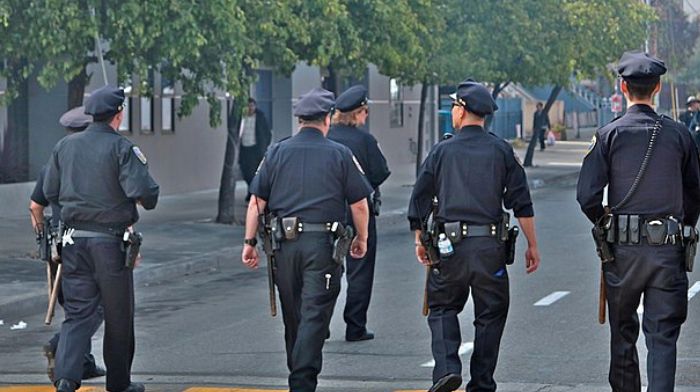By Susan Crabtree for RealClearPolitics
As the dust has settled in the days since a political earthquake hit California with the landslide recall of San Francisco District Attorney Chesa Boudin, a distinct voting pattern has emerged.
Precinct-by-precinct voting maps show minority voters backing the recall in much higher numbers than college-educated, affluent white progressives, with very few exceptions. It’s not difficult to understand why, California political analysts across the spectrum tell RealClearPolitics.
Minority communities suffer more when crimes rates are soaring than insulated wealthier neighborhoods with more protections and money for security.
“While we are fewer in number [than in the city’s past], we saw more African Americans resist the narrative that you have to reject this recall, it’s racist, it’s not progressive, it’s about conservatism, and they’re trying to dupe you,” Andrea Shorter, spokeswoman for Safer SF Without Boudin, the largest Boudin recall group, told RCP.
RELATED: DeSantis Rips Media For Sparse Coverage Of Murder Attempt On Justice Kavanaugh
“We’re looking around, and a lot of the bodies that are stacking up, whether it’s from fentanyl or from violent assaults from folks who should not have been on our streets…are people of color.”
Under different circumstances, Shorter and Boudin would have been aligned in their pursuit of criminal justice reform. Shorter has spent 25 years in San Francisco as a community organizer and political strategist specializing in criminal and juvenile justice reform, gender equity, and LGBTQ workplace inclusion. But the city’s interwoven problems of homelessness, high crime, and rampant drug dealing had brought Shorter to a breaking point with liberal orthodoxy.
“There’s this romantic notion of what being a progressive means versus the reality of policies that are not having a positive impact on our lives,” she said. “When there are open-air drug markets in the Tenderloin – well, who’s getting hurt by that? We’re all getting hurt, but it’s mostly people of color that are hurt.”
Support Conservative Voices!
Sign up to receive the latest political news, insight, and commentary delivered directly to your inbox.
San Francisco is one of the most ethnically diverse cities in the country; its residents speak more than 100 languages. Asians make up roughly a third of the city’s population, with a large percentage of its business owners anchored in Chinatown, which voted 68% in favor of the recall.
Several high-profile Asian community leaders helped spearhead the recall, including Mary Jung, former chair of the San Francisco Democratic Party, and Leanna Louie, a small-business owner and veteran who was one of 60 Asian Americans assaulted on the streets of San Francisco in 2021 – more than a six-fold increase from 2020.
Louie began volunteering with a community-run task force to patrol Chinatown’s neighborhood when shop owners began experiencing a significant uptake in burglaries and vandalism.
“There’s two kinds of people in San Francisco. Ones who were victims and ones who are about to be victims, if Chesa doesn’t get recalled,” Louie told Newsweek days before the recall. “Most people who come by us have already had their cars smashed in several times, their houses broken into or their [businesses] have been vandalized.”
Shorter and others point to an alarming statistic: Fentanyl overdoses in San Francisco killed more people than COVID over the last year. While the surging fentanyl crisis killed nearly 500 people last year, Boudin’s office reportedly did not secure a single conviction for dealing the deadly opioid for cases filed during 2021.
RELATED: BLM Lawyers Who Threw Firebombs In 2020 Riots Get Major Leniency Thanks To Biden DOJ
Boudin’s office notched just three total convictions of “possession with intent to sell” drugs in 2021 – two for methamphetamine and one for a case including heroin and cocaine. By contrast, Boudin’s predecessor, George Gascón, who is now the DA in Los Angeles (and is facing his own recall election in November), oversaw more than 90 drug-dealing convictions in 2018.
While Boudin, a former public defender, has blamed billionaire conservatives for funding the effort to toss him from office, voting patterns tell a different story. Boudin lost nearly every heavily minority neighborhood in the city, except Mission District, which has historically served as the center of the Hispanic community but has been gentrified with the dot-com boom and young urban professionals moving into the area.
Garry South, a longtime California Democratic political consultant , said people are fed up with the brazen attacks on the streets at all hours of the day and night. South, who outlined his thoughts in a Friday CalMatters op-ed, doesn’t foresee a widespread movement of minority voters toward the Republican Party. He asserts that voters are simply expressing a desire for a basic level of public safety.
“There’s an old political adage that conservatives are liberals who have been mugged,” South said. “I think that’s too simplistic when it comes to California. These minority voters are still going to vote Democratic in the fall. It’s just that they are fed up.”
“There’s a reason we call DAs prosecutors – that’s their primary job – to prosecute people who commit crimes,” South continued. “It’s not to act like public defenders. We already have those. The role of the DA is not to be a social welfare agency coming up with excuses for criminals.”
South warns against connecting San Francisco’s lopsided Boudin recall to billionaire businessman Rick Caruso’s surprise besting of Democratic Rep. Karen Bass by three percentage points in the Los Angeles mayoral race. Caruso, a Republican who changed his registration to Democrat before he announced his mayoral run, and Bass will meet in a runoff in November in a race that has focused mainly on crime and homelessness.
Caruso has pledged to hire 1,500 new police officers within his first term and build 30,000 shelter beds in his first 300 days. Bass’ plan to reduce crime has focused mainly on criminal justice reform and combating “conditions that lead to crime,” although she has pledged to be “smart on crime” if elected.
RELATED: How The TV Show ‘COPS’ Messed Up Americans’ Views Of Policing And Crime
To South, Bass simply could not compete with Caruso’s ability to self-finance. The real estate developer has spent nearly $41 million so far in the race, at least $10 million of which was devoted to ads bashing Bass on everything from rising crime to missed House votes to a dust-up over largesse from the University of Southern California. (Bass received a USC scholarship worth $95,000 while serving in Congress.)
“That’s a terrible return on investment – he spent $41 million and got 41% of the vote, and she spent 4 [million] and got 38%,” South said. “He outspent her 10 to one. In November, when there will be much larger turnout and younger turnout, I don’t think he pulls it off.”
But there are signs that Bass is also having trouble with minority voters despite her history as a community activist and chair of the Congressional Black Caucus. A survey conducted by political polling group BSP Research between April 20 and May 3 suggested Caruso was more popular than Bass among registered Latino voters, a crucial demographic in Los Angeles.
Caruso also had a favorable rating of 47% compared to Bass’ 44%. A more recent UC- Berkeley Institute poll, taken in late May, found that roughly half of black men had planned to vote for Caruso in Tuesday’s primary.
In mid-May, legendary Long Beach rapper Snoop Dogg reached out to Caruso and offered his endorsement, saying that he was doing so because of Caruso’s work with “Sweet Alice” Harris, a beloved community organizer in Watts who also endorsed Caruso.
A few days later, Clarence Avant, a music industry mogul who introduced then-Sen. Barack Obama to Southern California’s political and entertainment circles, also endorsed Caruso. A Los Angeles Times op-ed suggesting Bass was having trouble with black men noted that Avant’s wife, Jacqueline, was murdered last year during an invasion of their Beverly Hills home.
To Republicans, it’s a no-brainer: California residents of all political stripes and ethnicities are fed up with rampant crime and homelessness.
“I think you can conclude that neighborhoods most impacted by crime and homelessness are going to vote on those issues,” Rob Stutzman, who served as deputy chief of staff for former California Gov. Arnold Schwarzenegger, told RCP. “Neighborhoods that bear the brunt of this – they’re going to vote to have order restored in their communities, and of course urban Democrats in these big cities need to be wary of that.”
Stutzman called Boudin a “dead coyote that ranchers shoot and throw over the fence with the other coyotes to look at as a warning.”
RELATED: Pro-Abortion Group Firebombs Pregnancy Center In New York
Caruso, he predicted, will be able to compete for support in the Latino, Asian, and black communities, because Los Angeles has become so dysfunctional in recent years, especially concerning the city’s homelessness problem. While crime has been soaring in many parts of the country in recent years, homelessness is particularly vexing for California with its “drug dens” flowing with crime.
“It’s just snowballing here, and you don’t feel you’re in the United States in a lot of these places. Every big California city is dealing with it – Fresno, Sacramento, cities all throughout eastern Los Angeles County. These issues transcend partisanship because it has to do with fundamentally how do you feel when you walk outside your door, drive down your street and around your neighborhood?”
Voters should listen carefully to the substance and not just the talking points on issues of crime and homelessness, Stutzman warned. Boudin’s recall will likely spur a seismic shift in rhetoric from Democrats across the state and the country, but fundamental policy changes must be made to change the status quo.
If Bass and other Democrats don’t switch from a “housing-first priority to shelter-first, and if counties cannot deliver basic services” to help people with drug and mental health issues rehabilitate and get off the streets, it’s just more of the same, he said.
“Rhetoric is what people have been hearing in this state now for year after year after year, including from the governor, and the problem keeps getting worse,” he said. “So, if people feel like their vote matters on this like it did in San Francisco, yeah, they’re gonna cast it.”
Syndicated with permission from Real Clear Wire.
Susan Crabtree is RealClearPolitics’ White House/national political correspondent.
The opinions expressed by contributors and/or content partners are their own and do not necessarily reflect the views of The Political Insider.


























































